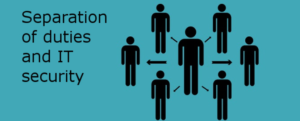Table of Contents
One of the most important things you can do is create and enforce a sound SoD policy when it comes to data security. This stands for “separation of duties,” and it’s a key factor in preventing unauthorized access to your company’s sensitive information.
In this article, we will discuss what separation of duties policy is and how you can implement one for your business. We’ll also provide some tips on how to get your employees on board with the new security measures.
Why Do You Need A SoD Policy?
A separation of duties policy is important for two primary reasons. First, it helps to prevent unauthorized access to sensitive data. Limiting who has access to specific information makes it more difficult for a malicious actor to gain access to your systems and steal your data.
Second, an SoD policy can help protect you from financial fraud and other crimes. When critical tasks are divided among multiple employees, it becomes much more difficult for someone to commit fraud or embezzlement.
How To Create An SoD Policy
There is no one-size-fits-all approach to creating an SoD policy, but there are some general tips that you can follow:
Start by identifying the critical processes and data within your company. This will help you determine which positions should have access to which information.
Once you have a good understanding of your company’s critical processes and data, you can start to develop policies that limit access to specific individuals.
It’s important to strike a balance between security and efficiency. You don’t want to make it so difficult for employees to do their jobs that they become frustrated and start looking for ways around the system.
Make sure that your SoD policy is well documented and easy to understand. This will make it easier for employees to comply with the new rules.
Must Read: Everything You Need to Know About Digital Certificates
The Benefits Of Having An SoD Policy In Place
There are several benefits of having an SoD policy in place, including:
Improved security: By separating duties among multiple employees, you make it more difficult for a malicious actor to access your systems and steal your data.
Reduced risk of fraud: When critical tasks are divided among multiple employees, it becomes much more difficult for someone to commit fraud or embezzlement.
Increased efficiency: By limiting access to specific individuals, you can reduce the risk of data corruption or loss.
How To Enforce Your Separation Of Duties Policy
Once you have put your SoD policy in place, it’s important to enforce it. This can be done in several ways, including:
- Training employees on the new policies and procedures.
- Implementing systems that track which employees have access to specific data.
- Conduct regular audits to ensure that employees comply with the new rules.
Tips For Keeping Your Data Safe And Secure
In addition to implementing an SoD policy, there are a few other things you can do to keep your data safe and secure:
- Use strong passwords and change them regularly.
- encrypt sensitive data.
- Keep your systems up to date with the latest security patches.
- Train employees on basic cybersecurity best practices.
When it comes to data security, there is no room for complacency. To protect your company’s sensitive data, you need to have an effective separation of duties policy in place. This article will discuss what an SoD policy is, how to create one for your business and the benefits of having such a policy in place. We will also offer tips for enforcing your policy and keeping your data safe and secure.





![1000 Girl Attitude Names for Truecaller ID | UPDATED [Included Boys Names] 1000 Attitude Names for Girls on Truecaller](https://edutechbuddy.com/wp-content/uploads/2025/05/ChatGPT-Image-May-21-2025-11_59_39-PM-1-150x150.png)






![1000 Girl Attitude Names for Truecaller ID | UPDATED [Included Boys Names] 7 1000 Attitude Names for Girls on Truecaller](https://edutechbuddy.com/wp-content/uploads/2025/05/ChatGPT-Image-May-21-2025-11_59_39-PM-1.png)